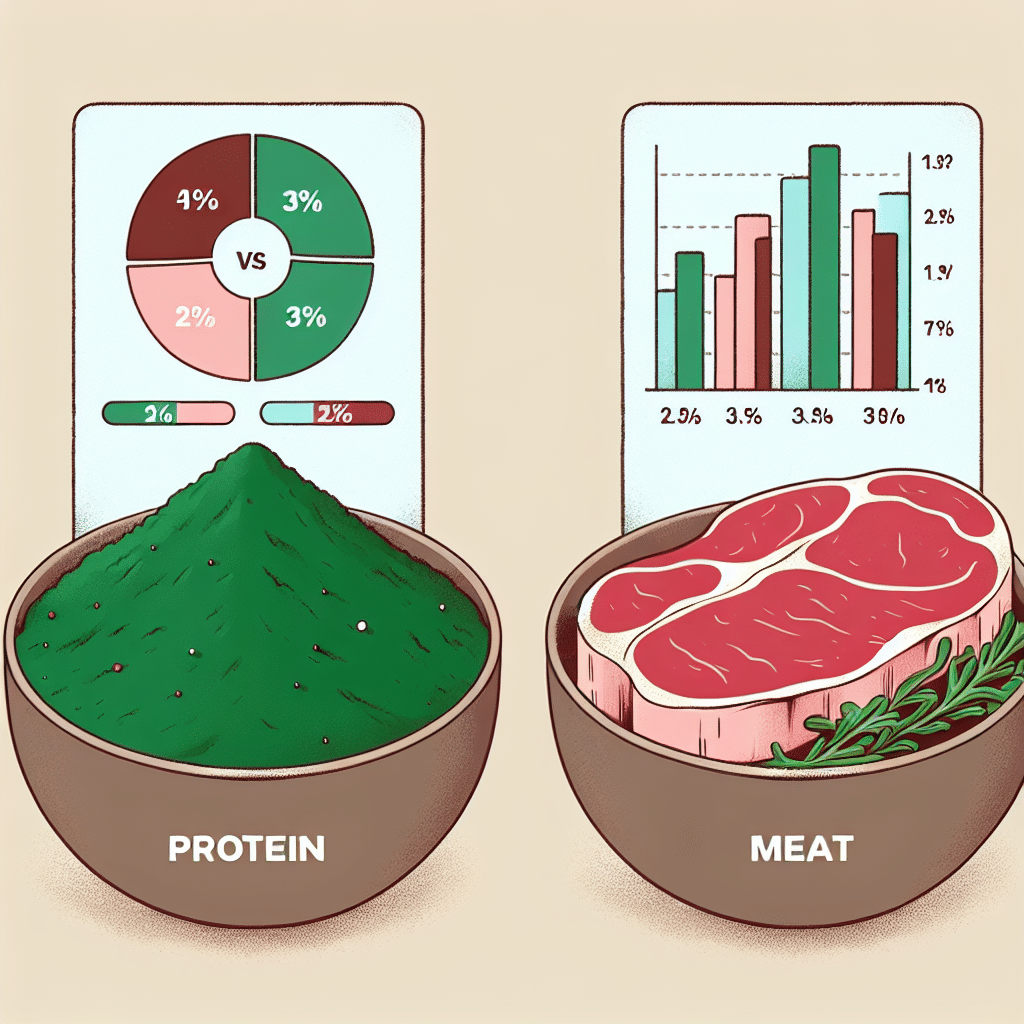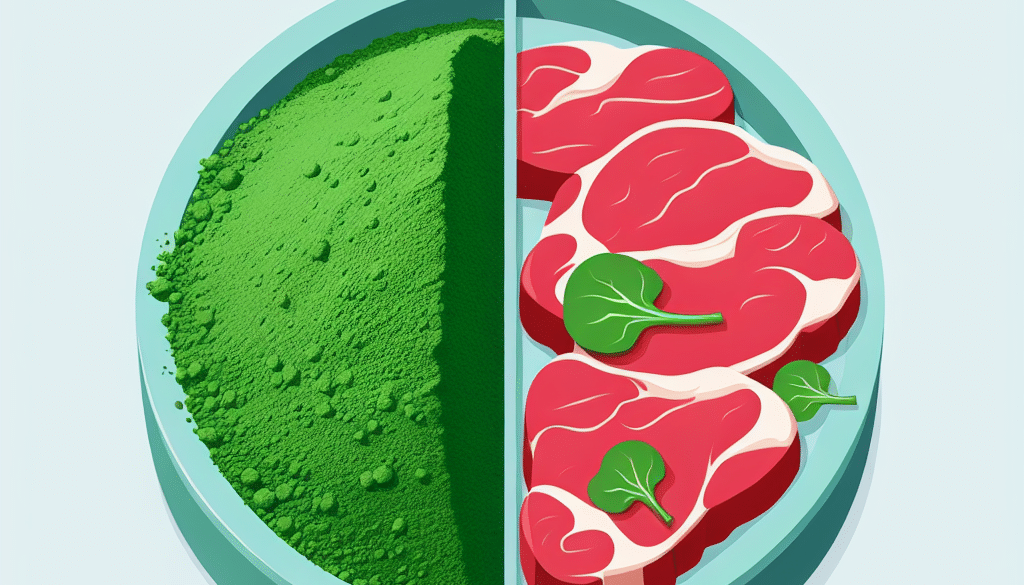Does Spirulina Have More Protein Than Meat?
-
Table of Contents
- Spirulina vs. Meat: A Protein Comparison
- Understanding Protein Quality and Quantity
- Protein Content of Spirulina
- Protein Content of Meat
- Comparing Spirulina and Meat Protein
- Nutritional Benefits Beyond Protein
- Spirulina’s Nutritional Profile
- Meat’s Nutritional Profile
- Environmental and Ethical Considerations
- Spirulina’s Sustainability
- Meat’s Environmental Impact
- Practicality and Accessibility
- Conclusion: Balancing Protein Sources
- Discover ETprotein’s High-Quality Protein Products
Spirulina vs. Meat: A Protein Comparison

When it comes to protein sources, the debate between plant-based and animal-based options is ongoing. Spirulina, a type of blue-green algae, has been touted for its high protein content, but how does it stack up against traditional meat sources? This article delves into the protein content of spirulina compared to meat, examining the nutritional profiles, benefits, and considerations of each.
Understanding Protein Quality and Quantity
Before comparing spirulina and meat, it’s essential to understand what makes a protein source valuable. Protein quality is determined by its amino acid profile and digestibility. A complete protein contains all nine essential amino acids in sufficient amounts. Quantity, on the other hand, refers to the amount of protein per serving or weight.
Protein Content of Spirulina
Spirulina is often celebrated for its protein content, which can be as high as 60-70% of its dry weight. This means that, gram for gram, spirulina is incredibly protein-rich. For example, a 100-gram serving of dry spirulina powder can contain around 60 grams of protein.
- Complete Protein: Spirulina contains all nine essential amino acids, making it a complete protein.
- Digestibility: Spirulina’s protein is highly digestible, with a digestibility rate comparable to that of eggs.
Protein Content of Meat
Meat is a well-known source of high-quality protein. The protein content in meat can vary depending on the type of meat and how it’s prepared. On average, a 100-gram serving of cooked beef might offer about 26 grams of protein, while chicken breast provides around 31 grams.
- Complete Protein: Like spirulina, meat provides all essential amino acids required by the body.
- Digestibility: Animal proteins are generally highly digestible and readily utilized by the body.
Comparing Spirulina and Meat Protein
When directly comparing the protein content, spirulina seems to have a higher protein percentage per dry weight than most meats. However, it’s important to consider the typical serving sizes and the practicality of consuming large amounts of spirulina. People generally consume meat in larger quantities than spirulina, which is usually taken in small doses, such as in supplements or as a food additive.
Nutritional Benefits Beyond Protein
Both spirulina and meat offer additional nutritional benefits beyond their protein content:
Spirulina’s Nutritional Profile
- Rich in vitamins and minerals, including B vitamins, iron, and manganese.
- Contains antioxidants and anti-inflammatory compounds.
- Low in calories and fat, making it a lean protein source.
Meat’s Nutritional Profile
- Provides essential nutrients such as vitamin B12, iron, zinc, and selenium.
- Contains saturated fats and cholesterol, which should be consumed in moderation.
- Offers a more satiating option due to its fat content and texture.
Environmental and Ethical Considerations
Choosing between spirulina and meat isn’t just about nutrition; environmental and ethical factors also play a role:
Spirulina’s Sustainability
- Requires less land and water to produce compared to livestock.
- Produces fewer greenhouse gases.
- Can be grown in controlled environments, reducing the impact on natural ecosystems.
Meat’s Environmental Impact
- Livestock farming is a significant contributor to deforestation and greenhouse gas emissions.
- Raises concerns about animal welfare and the use of antibiotics and hormones.
- Requires more resources, such as water and feed, to produce the same amount of protein as plants.
Practicality and Accessibility
While spirulina may offer a high protein content, its accessibility and practicality as a primary protein source can be challenging:
- Spirulina is often more expensive per gram of protein compared to meat.
- It may not be as readily available in all regions or markets.
- The taste and texture of spirulina can be off-putting to some, limiting its use in meals.
Conclusion: Balancing Protein Sources
In conclusion, while spirulina boasts a higher protein percentage per dry weight than meat, practical considerations such as serving size, cost, and accessibility must be taken into account. Both spirulina and meat have their unique nutritional benefits and drawbacks. A balanced diet that includes a variety of protein sources can help ensure that you receive all the essential amino acids and nutrients your body needs.
Discover ETprotein’s High-Quality Protein Products
If you’re looking for diverse protein options, ETprotein offers a range of high-quality, organic bulk vegan proteins. Their products cater to various industries and dietary preferences, ensuring that you can find the right protein source for your needs.
About ETprotein:
ETprotein, a reputable protein and L-(+)-Ergothioneine (EGT) Chinese factory manufacturer and supplier, is renowned for producing, stocking, exporting, and delivering the highest quality organic bulk vegan proteins and L-(+)-Ergothioneine. They include Organic rice protein, clear rice protein, pea protein, clear pea protein, watermelon seed protein, pumpkin seed protein, sunflower seed protein, mung bean protein, peanut protein, and L-(+)-Ergothioneine EGT Pharmaceutical grade, L-(+)-Ergothioneine EGT food grade, L-(+)-Ergothioneine EGT cosmetic grade, L-(+)-Ergothioneine EGT reference grade and L-(+)-Ergothioneine EGT standard. Their offerings, characterized by a neutral taste, non-GMO, allergen-free attributes, with L-(+)-Ergothioneine purity over 98%, 99%, cater to a diverse range of industries. They serve nutraceutical, pharmaceutical, cosmeceutical, veterinary, as well as food and beverage finished product distributors, traders, and manufacturers across Europe, USA, Canada, Australia, Thailand, Japan, Korea, Brazil, and Chile, among others.
ETprotein specialization includes exporting and delivering tailor-made protein powder and finished nutritional supplements. Their extensive product range covers sectors like Food and Beverage, Sports Nutrition, Weight Management, Dietary Supplements, Health and Wellness Products, and Infant Formula, ensuring comprehensive solutions to meet all your protein needs.
As a trusted company by leading global food and beverage brands and Fortune 500 companies, ETprotein reinforces China’s reputation in the global arena. For more information or to sample their products, please contact them and email sales(at)ETprotein.com today.












